Black women’s skin has unique characteristics that deserve specialized care and attention. We’ve all heard the saying that “Black don’t crack” but achieving that radiant, healthy glow requires understanding the exact needs of melanin-rich skin. From dealing with hyperpigmentation to managing dryness, our skincare journey often looks different from mainstream beauty advice.
Understanding your skin’s unique properties isn’t just about vanity – it’s about self-care and confidence. Melanin provides natural sun protection, but it also makes our skin more prone to certain concerns like dark spots, keloid scarring, and uneven texture. We need targeted answers that work with our skin, not against it.
That’s why we’ve created this comprehensive guide to help you build an effective skincare routine customized specifically for Black women. Whether you’re dealing with acne, aging, or simply want to maintain your skin’s natural beauty, we’ll walk you through proven strategies that deliver real results.
Understanding the Unique Needs of Black Women’s Skin
We recognize that Black women’s skin has distinct characteristics that require specialized care and attention. Understanding these unique features helps us develop more effective skincare routines.
Higher Melanin Content and Its Benefits
Melanin provides natural sun protection that’s equivalent to an SPF of 13.4, offering significantly more defense against UV rays than lighter skin tones. This built-in protection helps reduce the risk of skin cancer and slows down visible signs of aging like fine lines and wrinkles.
Natural anti-aging properties come from melanin’s ability to absorb and scatter harmful UV radiation. We see fewer wrinkles and age spots developing in Black women compared to those with lighter complexions, particularly in the early stages of aging.
Enhanced skin thickness characterizes Black women’s skin, which contains more collagen and elastin fibers. This structural advantage contributes to a firmer appearance and better elasticity over time.
Common Skin Concerns Exact to Black Women
Hyperpigmentation affects up to 65% of Black women, making it the most prevalent skin concern in this demographic. Dark spots, melasma, and post-inflammatory hyperpigmentation develop more easily due to increased melanin production triggered by inflammation or hormonal changes.
Keloid scarring occurs 15 times more frequently in Black individuals compared to other ethnic groups. These raised, thick scars can develop from minor injuries, acne, or even routine procedures like ear piercing.
Seborrheic dermatitis appears in 13% of Black women, causing scaly, itchy patches particularly around the hairline and eyebrows. This condition often gets misdiagnosed because its presentation differs from typical cases in lighter skin tones.
Razor bumps and ingrown hairs plague many Black women due to naturally curved hair follicles. These bumps can lead to permanent scarring and hyperpigmentation if not properly managed.
The Importance of Targeted Skincare Approaches
Ingredient selection becomes critical when addressing Black women’s exact skin concerns. We need products containing hydroquinone, kojic acid, or vitamin C to combat hyperpigmentation effectively, while avoiding harsh ingredients that can trigger more pigmentation issues.
Gentle exfoliation methods work best for Black women’s skin, as aggressive scrubbing can worsen hyperpigmentation and cause inflammation. Chemical exfoliants like glycolic acid and salicylic acid provide better results than physical scrubs.
Moisturizing requirements differ significantly because Black women’s skin tends to lose moisture faster even though appearing oily. We recommend heavier, occlusive moisturizers containing ceramides and hyaluronic acid to maintain proper hydration levels.
Professional treatment modifications ensure safety and effectiveness for darker skin tones. Laser treatments, chemical peels, and other procedures require exact settings and techniques to prevent burns or permanent pigmentation changes.
Building a Foundation with Gentle Cleansing

Black skin’s unique structure requires extra care to preserve its natural moisture barrier. Since melanin-rich skin contains lower ceramide levels, it loses moisture faster than lighter skin tones, making gentle cleansing techniques absolutely essential for maintaining healthy radiance.
Choosing the Right Cleanser for Your Skin Type
Dry and sensitive skin types benefit most from creamy, nourishing cleansers that contain hydrating ingredients like rosehip seed oil, sunflower seed oil, and aloe leaf juice. These formulations soothe while cleansing without disrupting our skin’s delicate moisture balance.
Combination and acne-prone skin requires cleansers that balance oil production without over-drying. We recommend looking for gentle gel-based formulas that remove excess sebum while maintaining essential hydration levels.
Sulfate-free formulations work best for all Black skin types since sulfates and harsh detergents strip away our skin’s natural protective oils. Chemical surfactants can disrupt the skin barrier function, leading to increased dryness and potential irritation.
Double Cleansing Method for Deep Purification
Oil-based cleansers form the first step of this powerful technique, dissolving makeup, sunscreen, and excess oils without harsh rubbing. This initial cleanse prepares our skin for deeper purification while maintaining moisture levels.
Water-based cleansers complete the second step by removing residual impurities and sweat that the oil cleanser missed. This method deeply purifies without compromising our skin’s natural protective barrier.
Benefits for Black skin include reduced irritation from excessive scrubbing and better moisture retention throughout the cleansing process. Double cleansing promotes clearer, healthier skin while respecting our skin’s unique needs.
Avoiding Harsh Ingredients That Strip Natural Oils
Physical scrubs create microtears in our skin and should be avoided completely. Black skin’s tendency toward hyperpigmentation makes it especially vulnerable to damage from abrasive particles and rough textures.
High-concentration chemical exfoliants require professional guidance before use since our skin is more sensitive to strong acids. We recommend starting with lower concentrations and gradually building tolerance under dermatological supervision.
Alcohol-heavy formulas strip away essential natural oils that our skin needs to maintain its protective barrier. Instead, we should choose products containing hyaluronic acid, glycerin, and natural oils that support moisture retention and skin health.
Addressing Hyperpigmentation and Dark Spots
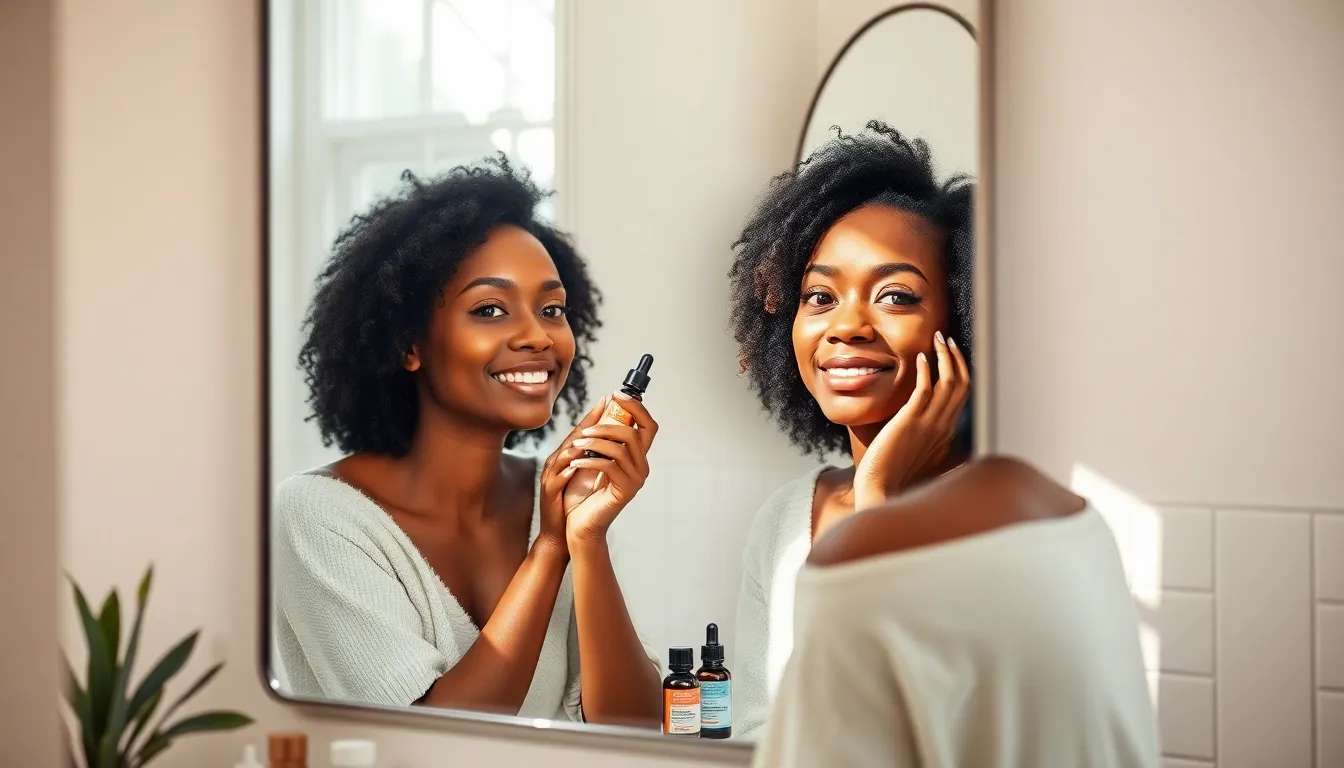
Dark spots and uneven skin tone represent some of the most persistent challenges we face in our skincare journey. Post-inflammatory hyperpigmentation affects our community disproportionately due to our skin’s unique melanin production patterns.
Understanding Post-Inflammatory Hyperpigmentation
Post-inflammatory hyperpigmentation occurs when our skin produces excess melanin following inflammation or injury from acne, insect bites, cuts, or burns. This natural response creates those stubborn dark patches and spots that can linger for months or even years after the initial trauma heals.
Our melanin-rich skin triggers this protective mechanism more readily than lighter skin tones, making us more susceptible to developing these discolored areas. Understanding this process helps us recognize why prevention and gentle treatment approaches work better than aggressive interventions that might cause additional inflammation.
The key to managing PIH lies in addressing both the underlying inflammation and the resulting pigmentation simultaneously through targeted skincare strategies.
Key Ingredients for Evening Skin Tone
Vitamin C stands as one of our most powerful allies in the fight against hyperpigmentation, offering antioxidant protection while actively brightening existing dark spots. We should apply vitamin C serums in the morning to maximize their protective and corrective benefits.
Retinoids accelerate cell turnover, helping fade dark spots over time by bringing fresh, unpigmented skin cells to the surface more quickly. Starting with lower concentrations and gradually increasing usage prevents irritation that could worsen hyperpigmentation.
Tyrosinase inhibitors like kojic acid, alpha arbutin, tranexamic acid, and niacinamide work by blocking melanin production at the source. These ingredients prove especially effective when used consistently in our nighttime routines.
Mandelic acid offers gentle exfoliation that’s particularly suitable for our sensitive or darker skin tones, providing the benefits of chemical exfoliation without the harsh irritation that stronger acids might cause.
| Ingredient Type | Primary Benefit | Best Application Time |
|---|---|---|
| Vitamin C | Brightening & Antioxidant | Morning |
| Retinoids | Cell Turnover | Night |
| Tyrosinase Inhibitors | Block Melanin Production | Night |
| Mandelic Acid | Gentle Exfoliation | 2-3 times per week |
Daily broad-spectrum sunscreen with tint remains non-negotiable, as UV exposure can darken existing spots and create new pigmentation issues.
Professional Treatments vs. At-Home Answers
At-home answers provide consistent, gentle correction through active ingredients we can control and adjust based on our skin’s response. Building a routine with vitamin C, retinoids, and niacinamide allows us to address hyperpigmentation safely over time while maintaining our skin’s health.
Chemical exfoliants should start at 2-3 applications per week, increasing frequency as our skin builds tolerance to prevent over-exfoliation and subsequent inflammation.
Laser therapy like intense pulsed light (IPL) can effectively target pigmented cells, but requires multiple sessions with specialists experienced in treating darker skin tones. The higher melanin content in our skin increases the risk of burns or paradoxical darkening if treatments aren’t properly calibrated.
Chemical peels using alpha-hydroxy, beta-hydroxy, and Jessner formulations help remove pigmented skin layers with minimal risk when performed correctly. Professional peels can accelerate results significantly compared to at-home treatments alone.
Consulting dermatologists who understand Black skin physiology becomes crucial before pursuing aggressive professional treatments, as our skin’s tendency toward post-inflammatory hyperpigmentation requires modified approaches and careful monitoring.
The combination of consistent at-home care with professionally guided treatments often yields the most effective and safest results for addressing our unique hyperpigmentation challenges.
Maintaining Proper Moisture Balance
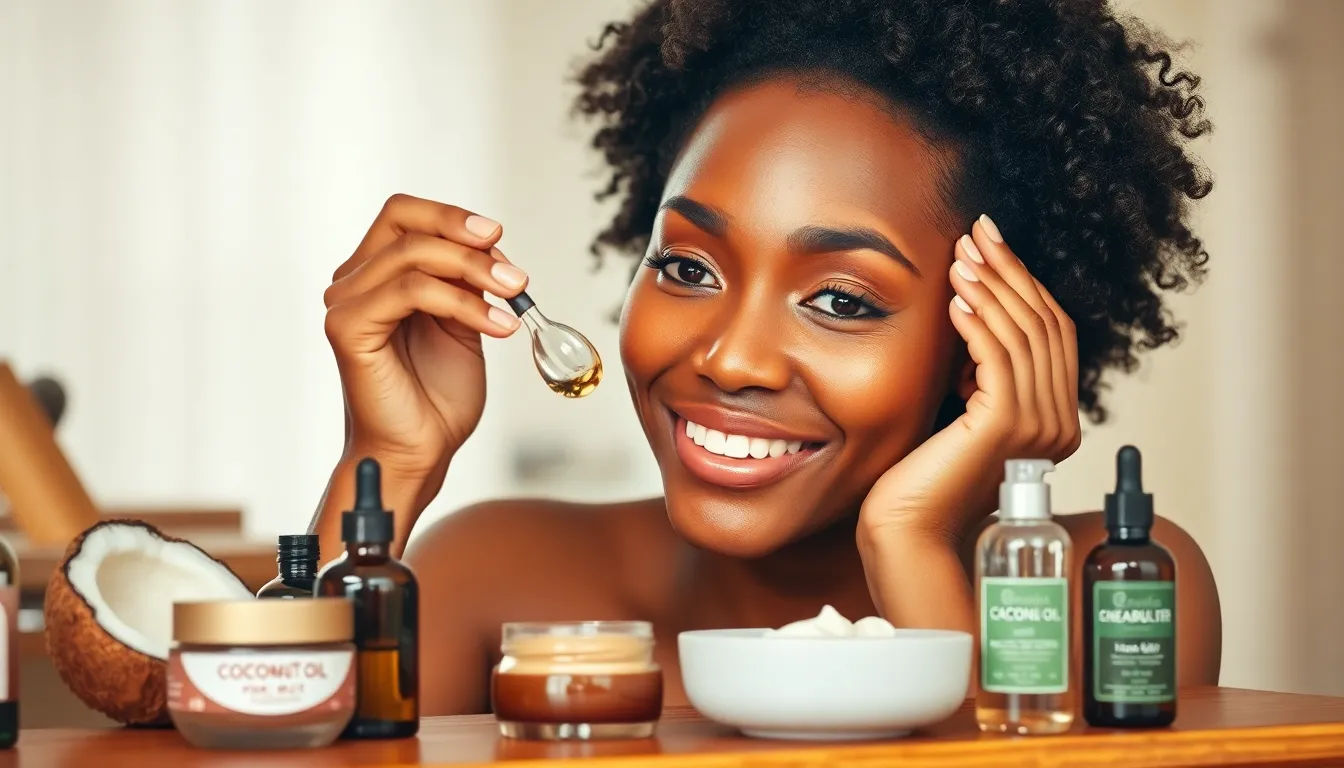
Moisture balance stands as the cornerstone of healthy skincare for Black women, whose skin naturally loses hydration more rapidly due to lower ceramide levels. We must prioritize gentle, non-comedogenic cleansers that preserve our skin’s natural oils while establishing a daily moisturizing routine that locks in essential hydration.
The Role of Natural Oils in Black Skin
Natural oils serve as powerful allies in maintaining our skin’s moisture barrier and overall health. These botanical extracts help lock in hydration while protecting against environmental stressors that can compromise our skin’s integrity.
Coconut oil emerges as a standout ingredient, offering antimicrobial properties alongside deep moisturization. Shea butter provides rich emollient benefits that reduce the appearance of fine lines and wrinkles while strengthening our skin’s protective barrier.
Jojoba oil mimics our skin’s natural sebum production, making it ideal for balancing moisture without clogging pores. Argan oil delivers vitamin E and essential fatty acids that nourish and repair damaged skin cells.
Using products that incorporate these natural oils helps us maintain optimal hydration levels while supporting our skin’s natural regeneration processes. These ingredients work synergistically to create a protective layer that prevents moisture loss throughout the day.
Best Moisturizers for Different Skin Types
Choosing the right moisturizer depends on understanding your exact skin characteristics and hydration needs. We’ve identified three key categories that address different moisture requirements:
| Skin Type | Moisturizer Characteristics | Key Benefits |
|---|---|---|
| Oily Skin | Lightweight, oil-free formulas | Won’t clog pores or increase shine |
| Dry Skin | Rich, emollient creams with natural oils | Locks in moisture for extended periods |
| Combination Skin | Balanced hydration formulas | Addresses both oily and dry areas |
Oily skin benefits from gel-based or water-based moisturizers that provide hydration without adding excess oil to already active sebaceous glands. Look for ingredients like hyaluronic acid and niacinamide that deliver moisture while controlling shine.
Dry skin requires richer formulations containing ceramides, natural oils, and humectants that attract and retain water molecules. These moisturizers should feel substantial on the skin and provide long-lasting comfort.
Combination skin needs strategic application of different products or a single moisturizer that balances hydration across varying skin zones. Focus on lightweight coverage in the T-zone while providing richer moisture to drier cheek areas.
Layering Products for Maximum Hydration
Layering skincare products strategically maximizes moisture retention and allows each product to perform its exact function effectively. We recommend following this systematic approach for optimal hydration results:
Step 1: Gentle Cleanser – Begin with a mild, pH-balanced cleanser that removes impurities without stripping natural oils from your skin’s surface.
Step 2: Balancing Toner – Apply a hydrating toner that restores your skin’s optimal pH levels while preparing it to absorb subsequent products more effectively.
Step 3: Hydrating Serum – Use serums containing hyaluronic acid or glycerin that deliver concentrated moisture directly to skin cells.
Step 4: Moisturizer Application – Seal in all previous layers with a moisturizer appropriate for your skin type, creating a protective barrier that prevents water loss.
Step 5: Daily Sunscreen Protection – Complete your routine with broad-spectrum SPF that shields your skin from UV damage while maintaining moisture levels throughout the day.
Each layer should be fully absorbed before applying the next product, allowing maximum penetration and effectiveness. This methodical approach ensures that every hydrating ingredient reaches its intended target while building comprehensive moisture protection.
Protecting Against Sun Damage

Understanding sun protection needs for Black skin requires addressing persistent misconceptions while implementing effective daily practices. Melanin provides some natural protection equivalent to SPF 4, but this level falls far short of adequate defense against harmful UV rays.
Debunking the Myth That Black Skin Doesn’t Need SPF
Melanin’s natural protection equals roughly SPF 4, which leaves our skin vulnerable to important UV damage even though common beliefs. This misconception has led many Black women to skip sunscreen entirely, resulting in premature aging, skin sagging, and pigmentation issues that could have been prevented.
Daily broad-spectrum sunscreen with at least SPF 30 becomes essential for all skin tones, including darker complexions, according to dermatological research. Sun damage manifests differently on Black skin through increased hyperpigmentation, uneven texture, and accelerated signs of aging rather than obvious burning.
Professional dermatologists consistently recommend SPF protection for Black women to prevent post-inflammatory hyperpigmentation from worsening. Without adequate sun protection, existing dark spots become darker and new pigmentation issues develop more readily.
Choosing Sunscreens That Don’t Leave White Residue
Tinted sunscreens offer excellent protection while blending seamlessly into darker skin tones without creating an ashy appearance. These formulations come in multiple shades designed specifically for melanin-rich skin, providing both coverage and UV defense.
Hybrid sunscreens combine chemical and physical protection methods, creating products that absorb quickly without leaving white residue. Zinc oxide and titanium dioxide formulations now include micronized particles that spread more evenly across darker complexions.
Liquid sunscreens with lightweight textures work particularly well under makeup and provide all-day protection without interfering with our skincare routines. Many brands now offer SPF products specifically formulated for Black skin that enhance rather than mask our natural glow.
Testing sunscreens on a small skin area helps determine which formulations work best with your exact undertones and daily routine. Look for products labeled as “invisible” or “clear” that specifically mention suitability for all skin tones.
Daily Sun Protection Habits to Adopt
Morning application should include broad-spectrum SPF 30 or higher as the final step in your skincare routine, applied 15 minutes before sun exposure. This timing allows the sunscreen to properly absorb and create an effective protective barrier.
Reapplication every two hours maintains optimal protection throughout the day, especially during outdoor activities, swimming, or excessive sweating. Keep travel-sized sunscreen in your purse or car for convenient touch-ups.
Hydrating combinations work best when you pair sunscreen application with lightweight moisturizers that support your skin’s moisture barrier. This approach prevents the drying effects some sunscreens can have on Black skin.
Peak hour avoidance between 10 AM and 4 PM significantly reduces UV exposure when the sun’s rays are strongest and most damaging. Plan outdoor activities for early morning or late afternoon when possible.
Protective clothing strategies include wide-brimmed hats, long-sleeved shirts, and UV-blocking sunglasses that complement your sunscreen routine. These physical barriers provide additional protection for areas that might miss sunscreen application.
Managing Acne and Breakouts Safely
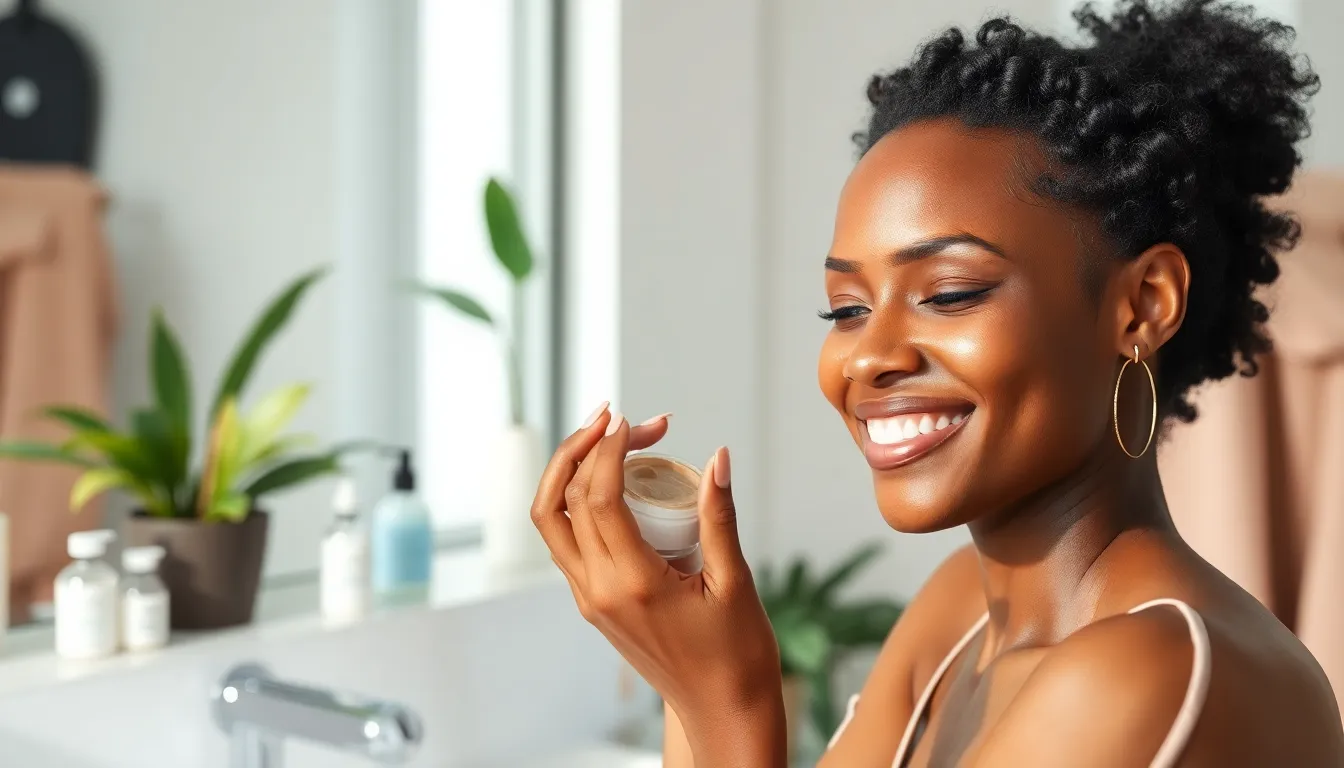
Building on our discussion of sun protection, we need to address one of the most common skin concerns for Black women: acne management. Treating breakouts safely requires a gentle approach that minimizes the risk of scarring and hyperpigmentation.
Gentle Acne Treatment Options
Topical antioxidants work exceptionally well for Black skin by targeting both acne and the hyperpigmentation that often follows breakouts. Vitamin C and niacinamide stand out as powerhouse ingredients that combat free radical damage from UV exposure while improving overall skin tone. These ingredients actively fight acne formation without causing the irritation that harsh treatments can trigger.
Mild cleansers customized to your exact skin type should replace aggressive scrubs that can worsen inflammation. Look for formulations containing calming ingredients like aloe vera and natural oils that nourish your skin without causing irritation. These gentle options maintain your skin’s natural barrier while effectively removing excess sebum and debris.
Spot treatments can be used strategically on active breakouts, but they must be followed immediately with proper moisturizing to maintain skin barrier health. Over-scrubbing and harsh chemical applications often lead to more inflammation and subsequent dark marks. Remember that gentle consistency beats aggressive intermittent treatments every time.
Preventing Keloid Scarring and Dark Marks
Daily sunscreen application becomes even more critical when managing acne, as UV and blue light exposure can worsen existing dark marks significantly. Black skin’s tendency toward post-inflammatory hyperpigmentation means that every breakout carries the potential for long-lasting discoloration if not properly protected.
Early acne treatment with gentle products reduces inflammation before it can trigger the scarring response that leads to keloids. Avoid aggressive scrubbing and harsh chemical exfoliants that can damage your skin’s surface and increase scarring risk. Instead, incorporate vitamin C and niacinamide into your routine to help fade existing dark marks while preventing new ones from forming.
Consistent gentle care proves more effective than sporadic intensive treatments for preventing both keloid formation and hyperpigmentation. Your skin responds better to regular, mild interventions than to harsh products that can trigger inflammatory responses.
When to Seek Professional Dermatological Help
Persistent or severe acne requires professional intervention from board-certified dermatologists who specialize in treating darker skin tones. These specialists can offer prescription topical medications, chemical peels formulated specifically for Black skin, and laser therapies that are both safe and effective for your skin type.
Early consultation prevents long-term damage like keloids and hyperpigmentation that can be much more challenging to treat once they develop. Professional treatments can be modified for safety and effectiveness on darker skin tones, ensuring that procedures use appropriate settings to avoid adverse effects.
Prominent scarring and discoloration signal the need for specialized care that goes beyond over-the-counter options. Dermatologists experienced with Black skin understand the unique challenges of treating acne while preventing the complications that disproportionately affect darker skin tones.
Incorporating Anti-Aging Ingredients
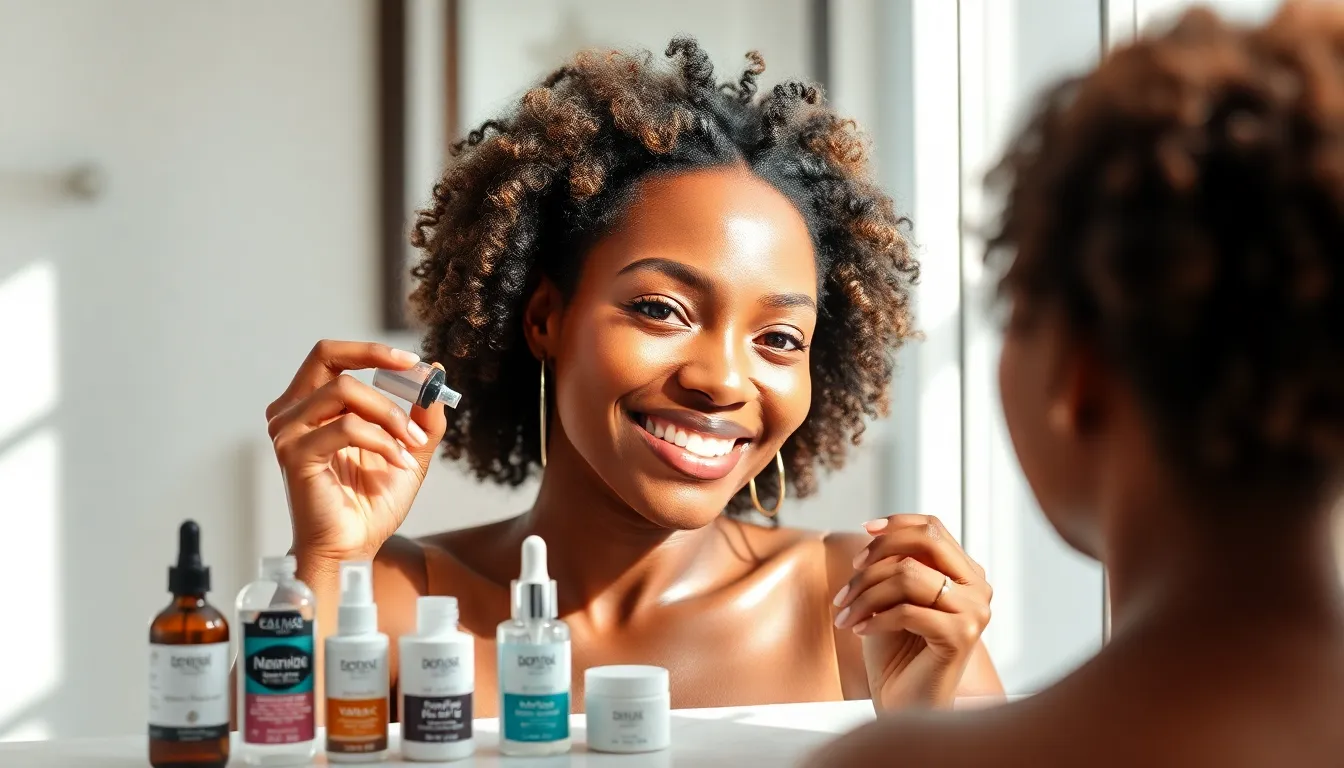
Effective anti-aging skincare for Black women requires strategic ingredient selection that addresses unique skin concerns while preventing hyperpigmentation. Building on our established moisture-rich foundation, we’ll explore three powerhouse ingredients that deliver visible results.
Retinoids and Their Benefits for Black Skin
Retinoids derived from vitamin A excel at promoting cell turnover and reducing fine lines while improving overall skin texture. We recommend starting with lower concentrations to avoid irritation that could trigger post-inflammatory hyperpigmentation in darker skin tones. Black skin responds particularly well to retinoids when they’re introduced gradually into evening routines.
Combining retinoids with protective measures like broad-spectrum sunscreen becomes essential since these ingredients increase photosensitivity. Professional guidance helps determine the optimal retinoid concentration for your exact skin type and concerns. Consistent use over several months typically yields the most dramatic improvements in skin smoothness and tone.
Vitamin C for Brightening and Protection
Vitamin C stands out as a powerful antioxidant that brightens skin while reducing existing hyperpigmentation patterns common in Black women. This ingredient works synergistically with niacinamide to enhance luminosity and create more even skin tone distribution. Morning application provides maximum protection against environmental stressors throughout the day.
Stability becomes crucial when selecting vitamin C products, as unstable formulations may cause irritation or deliver inconsistent results. L-ascorbic acid offers the most potent effects, while magnesium ascorbyl phosphate provides gentler action for sensitive skin types. Pairing vitamin C with sunscreen amplifies its protective benefits and prevents further pigmentation issues.
Peptides and Other Age-Fighting Compounds
Peptides function as short amino acid chains that stimulate collagen production to reduce wrinkles and improve skin elasticity over time. These compounds work particularly well for Black skin because they strengthen the skin barrier without causing irritation or unwanted pigmentation changes. Hyaluronic acid enhances peptide effectiveness by maintaining optimal hydration levels.
Glycolic acid provides gentle exfoliation benefits when used in lower concentrations, helping to reveal brighter skin beneath. Professional treatments may incorporate higher concentrations of these age-fighting compounds through customized facials or laser therapies. Consistent at-home use of peptide-rich formulations delivers cumulative benefits that become more apparent with extended use.
Creating a Consistent Daily Routine
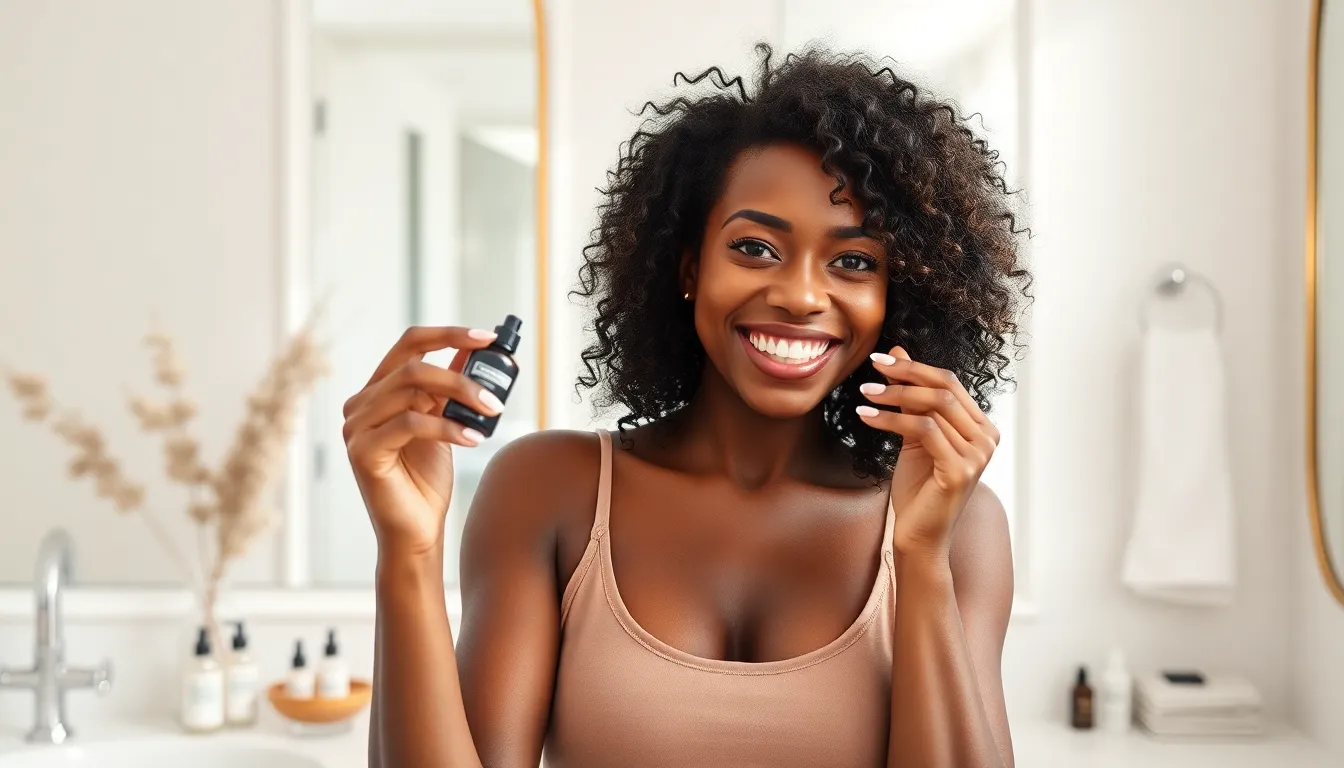
Establishing a daily skincare routine specifically designed for Black women’s unique needs transforms skin health over time. We’ll outline a comprehensive approach that addresses hydration, protection, and treatment while maintaining simplicity.
Morning Skincare Routine Steps
Cleanse your skin with a gentle cleanser that suits your exact skin type, whether oily, dry, or combination. We recommend avoiding harsh formulas that strip natural oils, instead choosing creamy cleansers for dry skin or gel-based options for combination and acne-prone skin.
Tone with a pH-balancing toner that prepares your skin for optimal product absorption. This step helps minimize pores while creating the perfect foundation for your subsequent skincare layers.
Serum application becomes crucial when targeting exact concerns like hyperpigmentation or environmental protection. We suggest incorporating Vitamin C serums in the morning to boost collagen production, reduce dark spots, and create a protective barrier against sun damage throughout the day.
Moisturize using products containing hyaluronic acid, glycerin, and natural oils such as kalahari oil or rosehip oil. These ingredients work together to lock in hydration, maintain plumpness, and support your skin’s natural firmness throughout daily activities.
Sunscreen serves as your final and most critical morning step, requiring broad-spectrum protection applied daily. We emphasize that this step prevents UV damage, stops new dark spots from forming, and preserves the health of melanin-rich skin regardless of your daily plans.
Evening Skincare Routine Essentials
Deep cleansing removes makeup, sunscreen, and accumulated impurities from your entire day. This thorough cleansing process ensures your skin can properly absorb treatment products applied during your nighttime routine.
Rebalancing your skin’s pH follows cleansing, helping to minimize pores while preparing your complexion for targeted treatments. Evening toners often contain slightly different formulations than morning versions to support overnight skin repair processes.
Treatment products like retinol, acne medications, or lightening agents for hyperpigmentation work most effectively during nighttime hours. We recommend introducing these active ingredients gradually to avoid irritation while allowing your skin to build tolerance over time.
Rich moisturizing completes your evening routine with heavier formulations that support skin regeneration during sleep. These nighttime moisturizers often contain repair-focused ingredients that work synergistically with your skin’s natural overnight renewal processes.
Weekly Treatments and Masks
Exfoliation should occur 1-2 times weekly using gentle chemical exfoliants rather than harsh physical scrubs. We recommend avoiding aggressive scrubbing motions that can cause irritation, instead choosing products with gentle acids that brighten skin while removing dead cells safely.
Hydrating masks applied weekly provide intensive moisture using ingredients like hyaluronic acid, rosehip, or Kalahari oil. These treatments help maintain optimal hydration levels while calming any irritation from daily environmental stressors or active ingredients.
Brightening masks containing Vitamin C or natural botanicals address uneven skin tone and reduce the appearance of dark spots. We suggest incorporating these treatments 1-2 times weekly to complement your daily routine while targeting exact pigmentation concerns common in Black skin.
Choosing Products from Black-Owned Beauty Brands
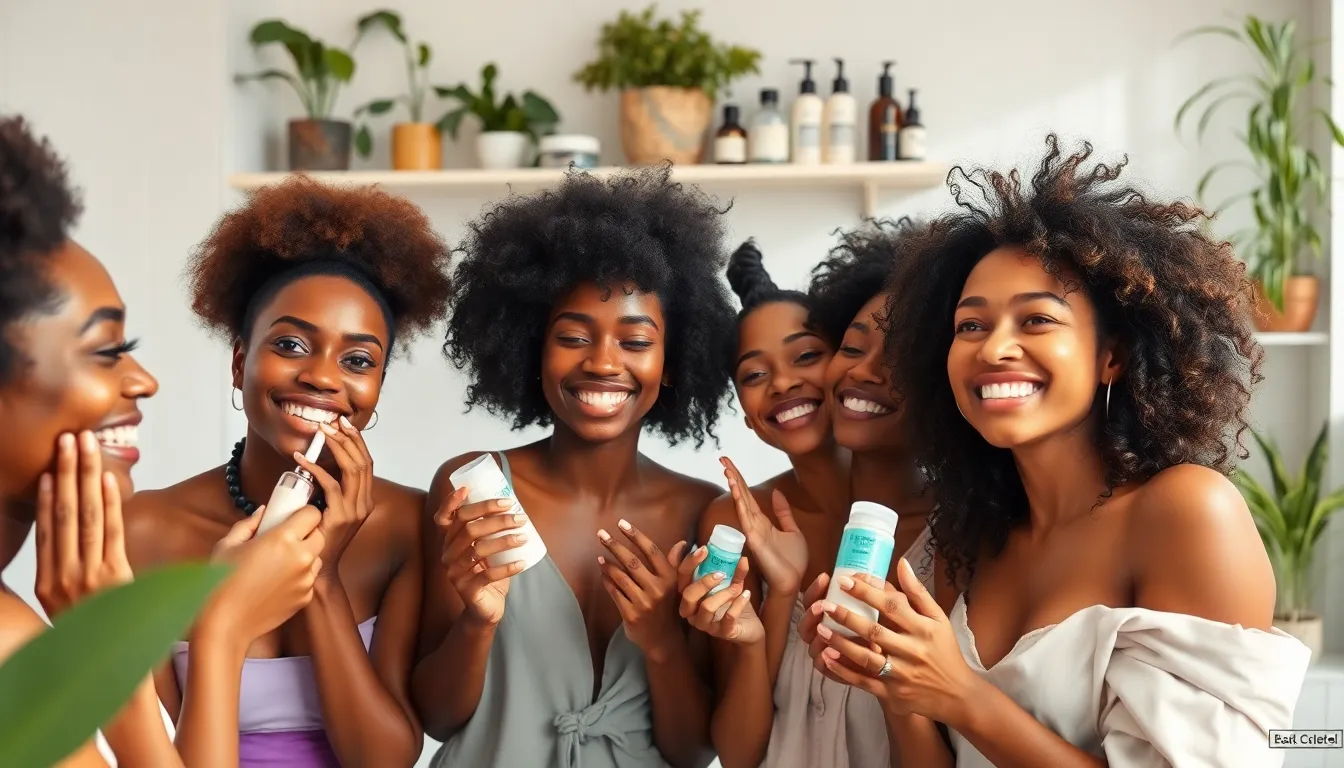
Black-owned beauty brands understand the exact skincare challenges we face and formulate products with our unique needs in mind. Supporting these companies ensures we’re investing in formulations created by people who share similar skin concerns.
Supporting Brands That Understand Your Needs
Black-owned skincare companies leverage cultural knowledge passed down through generations to create products that address our exact concerns. These brands are more likely to formulate answers for issues like dryness, acne, and hyperpigmentation because they understand how melanin-rich skin responds to different ingredients. Supporting these businesses helps address the gap in market offerings while ensuring products are created by those who truly understand our skin.
Traditional plant-based ingredients form the foundation of many Black-owned formulations, with brands incorporating shea butter, jojoba oil, and baobab oil into their products. These natural ingredients offer deep hydration while providing antioxidant benefits that help balance moisture levels in our skin. Many of these companies also support sustainable farming practices and local communities through their ingredient sourcing.
Top Black-Owned Skincare Companies to Consider
Platforms like BLK + GRN showcase products from over 136 Black artisans who use all-natural ingredients such as argan oil, rosemary, and clary sage. These curated collections focus on non-toxic formulations specifically designed for our skin needs. Organizations like Safe Cosmetics and The Skincare Edit regularly feature lists of recognized Black-owned brands that prioritize effective, safe skincare customized for Black women.
Looking for brands that emphasize ingredient transparency and cultural expertise ensures we find products that deliver real results. Many of these companies have been verified by the Campaign for Safe Cosmetics for their commitment to toxin-free formulations. Research shows that Black-owned brands increasingly focus on addressing hyperpigmentation, eczema, and maintaining moisture in melanin-rich skin.
Reading Labels and Understanding Ingredients
Reading product labels carefully helps us avoid harmful ingredients such as parabens, sulfates, and synthetic fragrances that can irritate our skin. Look for key natural ingredients like shea butter, jojoba oil, and moringa oil, which are effective and safe for most skin types. Understanding ingredient lists ensures we make informed choices that support our skincare goals.
Prioritizing products with proven hydrating ingredients becomes especially important since our skin loses moisture faster due to lower ceramide levels. Natural oils and butters work particularly well for maintaining our skin’s moisture barrier while providing nourishment. Always check for ingredients that target our exact concerns, such as vitamin C for hyperpigmentation or niacinamide for oil control and pore refinement.
Consulting with Dermatologists Who Specialize in Black Skin

Seeking professional guidance becomes essential when our home skincare routines need expert enhancement. Dermatologists who specialize in treating Black skin understand the unique challenges we face with hyperpigmentation, keloid scarring, and sensitivity to certain treatments.
Finding the Right Skincare Professional
Prioritize dermatologists with extensive experience treating darker skin tones. Board-certified Black dermatologists like Dr. Rosemarie Ingleton emphasize choosing licensed practitioners who have proven track records with patients of similar skin tones. We should request before-and-after photos to ensure the safety and appropriateness of treatments for our exact complexion.
Look for specialists who understand structural and pigment-related skin issues common among Black women. Dermatologists such as Jeanine Downie and Jeaneen Chappell stress the value of professionals who comprehend our unique concerns including hyperpigmentation and sensitivity patterns. These experts know that certain treatments like lasers and chemical peels require careful customization to avoid adverse effects.
Verify their experience with treatments that need modification for Black skin. Procedures like microneedling, chemical peels, and laser therapies must be carefully selected and adjusted to prevent irritation, hyperpigmentation, or scarring that commonly affects our skin type.
Questions to Ask During Your Consultation
Ask about their experience treating patients with your exact skin tone. This ensures they understand the nuances of caring for Black skin and have successfully addressed similar concerns. We need confidence that our dermatologist has hands-on experience with our skin type.
Request to see before-and-after photos of similar cases. Visual evidence helps us understand what realistic results look like for our skin tone and confirms the practitioner’s expertise with Black skin treatments.
Inquire about which treatments they recommend or avoid for darker skin tones. Understanding their approach helps us make informed decisions about procedures that might benefit or potentially harm our skin.
Learn how they prevent or manage hyperpigmentation risks. Since we’re more prone to post-inflammatory hyperpigmentation, we need specialists who have exact strategies to minimize these risks during treatments.
Discuss daily skincare products and ingredients they suggest for your skin concerns. Getting personalized recommendations ensures we’re using products that complement any professional treatments we receive.
When Over-the-Counter Products Aren’t Enough
Professional intervention becomes necessary when persistent issues like acne, hyperpigmentation, and scarring don’t respond to home care. Even with consistent use of gentle cleansers, broad-spectrum sunscreen with at least SPF 30, and antioxidants like vitamin C and niacinamide, some skin concerns require expert treatment.
Dermatologists can provide scientifically validated interventions customized for Black skin. These professionals understand that standard treatment protocols often need modification to be safe and effective for our skin type. They can offer advanced treatments like prescription-strength ingredients, professional chemical peels, and laser therapies specifically calibrated for darker skin tones.
Consider professional help when daily protective measures aren’t sufficient. While we should continue wearing sunscreen regardless of indoor or outdoor exposure to protect against UV rays and blue light, persistent uneven tone and aging signs may need professional-grade answers.
Seek expert care when gentle at-home treatments reach their limits. Professional dermatologists can address stubborn skin issues with safer, more potent interventions that go beyond what over-the-counter products can achieve for our exact skin needs.
Conclusion
We’ve covered the essential foundations for caring for Black women’s skin – from understanding melanin’s protective yet unique properties to building effective daily routines. The key lies in embracing gentle approaches that honor our skin’s natural characteristics while addressing exact concerns like hyperpigmentation and moisture retention.
Remember that consistency trumps complexity when it comes to skincare success. Whether you’re incorporating vitamin C serums or exploring Black-owned beauty brands our skin thrives with patient dedicated care rather than harsh quick fixes.
Your skincare journey is deeply personal and there’s no shame in seeking professional guidance when needed. Combining thoughtful at-home routines with expert dermatological support creates the strongest foundation for healthy radiant skin that celebrates your natural beauty.
Frequently Asked Questions
Does Black skin really need sunscreen?
Yes, Black skin absolutely needs sunscreen. While melanin provides natural protection equivalent to SPF 13.4, this is insufficient against UV damage. Daily broad-spectrum sunscreen with at least SPF 30 is essential for all skin tones to prevent premature aging, hyperpigmentation, and skin cancer. Choose tinted or hybrid formulas that blend well with darker skin.
Why is hyperpigmentation more common in Black women?
Black women are more prone to post-inflammatory hyperpigmentation due to unique melanin production patterns. When skin is irritated or inflamed from acne, razor bumps, or other trauma, melanocytes produce excess pigment as a protective response. This creates dark spots that can persist long after the initial inflammation heals.
What ingredients should Black women avoid in skincare products?
Avoid harsh physical scrubs, alcohol-heavy formulas, and aggressive exfoliants that can strip natural oils and damage the skin barrier. Stay away from products with sulfates, parabens, and synthetic fragrances. These ingredients can cause irritation, dryness, and worsen hyperpigmentation issues common in Black skin.
How often should Black women moisturize their skin?
Black women should moisturize twice daily – morning and evening – as their skin loses moisture more rapidly due to lower ceramide levels. Use heavier, oil-based moisturizers containing ingredients like shea butter, jojoba oil, or hyaluronic acid. During dry seasons or in harsh climates, additional moisturizing may be necessary.
What’s the best way to treat dark spots on Black skin?
Use gentle, consistent treatments with ingredients like vitamin C, retinoids, kojic acid, or mandelic acid. Apply these products at night and always follow with sunscreen during the day. Avoid aggressive treatments that can worsen hyperpigmentation. For persistent dark spots, consult a dermatologist experienced with darker skin tones.
Should Black women use different acne treatments?
Yes, Black women should use gentler acne treatments to minimize scarring and hyperpigmentation risks. Focus on mild cleansers with calming ingredients, spot treatments with salicylic acid or benzoyl peroxide, and antioxidants like niacinamide. Avoid harsh scrubs and over-drying products that can trigger more breakouts and dark marks.
How important is it to find a dermatologist who understands Black skin?
It’s crucial to find a dermatologist experienced with darker skin tones. They understand how treatments may react differently on Black skin and can adjust procedures like laser therapy or chemical peels accordingly. This expertise helps prevent adverse effects and ensures treatments are both safe and effective.
What’s the difference between cleansing Black skin versus other skin types?
Black skin requires gentler cleansing to preserve the natural moisture barrier, as it loses hydration faster. Use creamy, nourishing cleansers for dry/sensitive skin or gentle gel formulas for oily/combination skin. The double cleansing method works well for deep purification without stripping essential oils.
Are Black-owned skincare brands better for Black women?
Black-owned brands often have deeper understanding of Black women’s specific skincare challenges and cultural needs. They frequently incorporate traditional plant-based ingredients and formulate products specifically for darker skin tones. While not exclusively necessary, these brands can offer targeted solutions and cultural knowledge that mainstream brands may lack.
Can professional treatments be safely used on Black skin?
Yes, but they require expertise and proper modification. Treatments like laser therapy, chemical peels, and microdermabrasion must be performed by professionals experienced with darker skin tones. They need to adjust settings and techniques to prevent hyperpigmentation, scarring, or other adverse effects that can occur when treatments aren’t properly calibrated.







